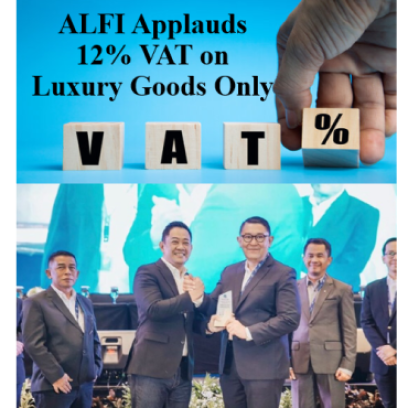The Indonesian Logistics and Forwarders Association (ALFI) has voiced its appreciation for the Indonesian government’s recent decision to impose a 12% Value Added Tax (VAT) solely on luxury goods and services.
The implementation date is 01 January. The new rate is a 1 percentage point increase from the previous rate of 11% which is still applicable for non-luxury goods and services, thus having minimal impact on the daily lives of the general public.
Meanwhile, basic goods and services such as rice, meat, fish, eggs, vegetables, fresh milk, along with essential services like education, health care, public transport, and basic housing, remain exempt from VAT, with a 0% tax rate applied.
Items subject to the 12% VAT include private jets, luxury yachts, cruise ships, luxury homes, and other goods classified as luxury items.
The new policy has been welcomed by various sectors, including ALFI. The association’s Advisory Board Chairman, Yukki Nugarahawan Hanafi, and General Chairperson, Akbar Johan, have both expressed their support for the policy.
Akbar Johan emphasized the positive impact of this policy on businesses, particularly within the logistics and forwarding sectors. By maintaining the 11% VAT rate for non-luxury goods and services, businesses in logistics will not face a significant tax burden.
He further explained that many shipping service providers include VAT in their rates, and with no change in the VAT rate, consumers of shipping services will not bear additional costs. “Ultimately, it is the consumer who absorbs the cost,” Akbar added.
The government, under President Prabowo Subianto and Minister of Finance Sri Mulyani Indrawati, clarified that the VAT increase from 11% to 12% would apply exclusively to luxury goods and services. Non-luxury items will continue to be taxed at the existing rate, which has been in place since 2022.
ALFI, representing logistics and forwarding businesses, views this decision as crucial for sustaining the nation’s economic growth. Yukki Nugarahawan Hanafi emphasized that the policy is designed to protect the purchasing power of the middle class while enhancing the competitiveness of Indonesia’s industrial sector.
He also appreciated the government’s provision of a transition period, which allows businesses time to adjust to the new VAT regulations. Entrepreneurs who have already implemented the 12% VAT can return the 1% excess tax to consumers, in accordance with the upcoming implementing regulations.
The Indonesian Chamber of Commerce and Industry (KADIN Indonesia) has also expressed strong support for the new policy. Prior to the announcement, KADIN had provided input to the government, highlighting the need for a careful review of the proposed VAT increase. This consultation involved various associations, including ALFI.
The overarching goal of this policy is to promote inclusive economic growth in Indonesia by balancing the protection of middle-class purchasing power with efforts to enhance state revenue through progressive taxation.
Also see our related article, Indonesia’s Need for Food Imports.
Jalak Kargo Logistik can provide full information about VAT, Customs Duty and other taxes relating to your imports and exports. We offer you professional advice on every aspect of international shipping, by sea and air, including customs clearance. Call us if you have project cargo or express courier consignments.



